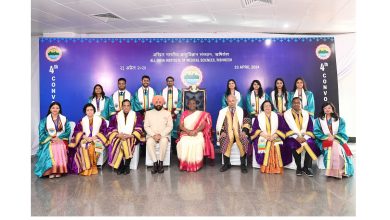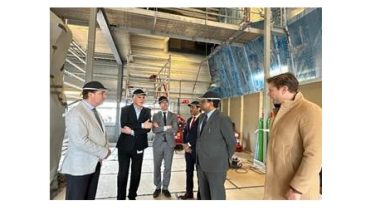E&Y unveils report on next-gen digital, data-driven health and sustainable practices

The report highlights critical aspects of digital technology, data, and sustainability in shaping the next generation of humanised healthcare
Ernst & Young Services in partnership with BioAsia, launched a report titled ‘Shaping the next generation of digital and data-driven healthcare and sustainable practices’. The report highlights critical aspects of digital technology, data, and sustainability in shaping the next generation of humanised healthcare.
Released at the marquee life sciences summit – BioAsia 2023 in Hyderabad, the report brings to light some of the new data-driven technologies that will fundamentally alter the way healthcare is imagined and delivered. The healthcare revolution and shift toward Intelligent Health Ecosystem is not just an opportunity but an urgent need. Drug development, clinical trials, manufacturing, and supply chain are some of the areas impacted by advanced technologies, such as AI ML and analytics that inform the next best actions. Further, as companies develop their long-term transformation and growth strategy, they need to ensure that it is based on a sustainability and ESG value-led model.
Suresh Subramanian, Partner & National Life Sciences Leader, EY India said, “The ubiquity of data and analytics is creating new opportunities for life sciences companies and health care service providers to rethink innovation and create personalized health outcomes. Platforms that connect, combine, and share data will be central enablers of this future value creation. As Indian companies prepare to shift from supplying commodities to supplying innovations, the role of new technology will become even more prominent in creating this integrated ecosystem.”
Adding to it, Shakthi Nagappan, Director of Life Sciences, Govt of Telangana and CEO, BioAsia said, “Healthcare and life sciences industry is becoming more and more digital, responsive, and focused on patients. Advanced technology and new analytical tools are shaping this healthcare revolution to drive personalised care and better patient outcomes. In this context, the Government of Telangana is proud to partner with EY as its knowledge partner for the 20th edition of BioAsia, and jointly release this pertinent report on the theme of ‘Advancing for ONE: Shaping the next generation of humanised healthcare’.”
Key insights from the report:
Shift toward Intelligent Health Ecosystem to deliver personalised health experiences
As the world of healthcare data continues to expand, AI offers a means to connect, combine and interrogate data differently and unlock actionable insights. The adoption of AI into care delivery will be a continuous learning process, in which healthcare algorithms continuously grow in intelligence and value. This data-driven smart system will enable one to break down the silos between care settings and optimize decision-making across the patient journey. Most importantly, it will finally offer a way to deliver truly human-centric care. The clinicians of the future may indeed become medical engineers and will be trained in artificial intelligence, big data, robotics and other emerging technologies and disciplines.
- Technology-driven transformation across the pharma value chain
Advanced technologies and data can play a central role in maximizing efficiencies and improving agility across the value chain quickly, efficiently, and effectively. For instance, AI and ML can monitor in-line manufacturing processes to ensure the safety and quality of drugs. These interventions will give life sciences companies confidence that their manufacturing processes are operating at a high standard and not putting the organization in breach of regulations.
Similarly, a digital twin can create a real-time simulation of the entire manufacturing process. Such a ’digital factory’ can allow companies to track the processes in real time, anticipate and predict potential failures, optimise quality and productivity, and get treatments to patients much faster.
- Revolution in patient-centric, virtual, and home-based care opening opportunities for MedTech
The past few years suggest that virtual, flexible care delivery offers benefits and improved outcomes beyond the extraordinary demands of the pandemic. In response, MedTech companies have innovated to deliver better outcomes, improve access to underserved populations and increase the detection of underdiagnosed diseases.
The industry will continue to embrace these opportunities. While IOMT and Generative AI will lead the way, there are still issues to address around regulatory and reimbursement aspects, and inequitable access to the digital technology and infrastructure (such as broadband) that is needed to deliver virtual care effectively. A collaborative effort between healthcare providers, patients, Tech start-ups and policymakers, can play a key role in addressing these challenges and optimizing integrated healthcare delivery.
- Life sciences companies creating long-term growth focusing on sustainability and ESG
For the life sciences industry, one key component of sustainability is the linkage between disease impact and the role innovative medical products and services play in reducing this burden. Since most frameworks are not specifically designed with life sciences companies in mind, a key challenge life they face is in deciding which of the numerous sustainability frameworks to use to measure value.
As the focus on sustainability is getting stronger, key value drivers cited by CEOs include responsible innovation (including R&D, bio-ethics), product quality and patient safety, climate change, diversity in clinical trials and corporate governance among others.




